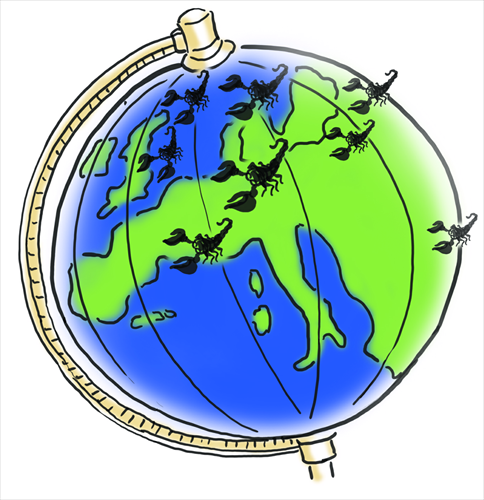European values under attack from terrorism

Illustration: Shen Lan /GT
This time it is Brussels. Just four months after the Paris terrorist attacks, the capital of Belgium has become the new target of Islamic State (IS) terrorists. An ordinary morning with people going to work was again the right moment for suicide bombers to strike by exploding themselves and spreading death and fear in the Brussels airport and subway. Belgium along with other European countries are under high alert to prevent similar terrorist attacks. However, optimism should not necessarily prevail in spite of increased security measures.
Europe is under attack. This is the case not only because atrocities in the capital of Belgium constitute a serious blow to the very heart of the EU but also because terrorists seem to be gaining ground across the continent.
The Brussels attack took place only four days after the capture of Paris terror suspect Salah Abdeslam in Molenbeek. But it may not have been a simple act of revenge. By contrast, it gives the impression of a well-orchestrated bomb explosion as part of a wider plan of extremist fighters to serve their inhuman cause. IS often threatens Europe, and often follows through on those threats.
European leaders have expressed their sympathy to the victims and their families and promised a strong reaction against terrorists. For their part, European citizens circulate slogans such as "freedom will win" and use social media hashtags such as "JeSuisBruxelles" to show their solidarity.
But apart from symbolism, all this leads nowhere. In reality, Europe is encountering a serious existential crisis as its values are critically challenged. Peoples of Europe were proud of their freedom of movement principle. Now they are naturally afraid to use means of public transportation or travel themselves.
Within this context, populists have a great opportunity to find supporters among desperate citizens by strongly criticizing the EU. There are various examples, such as the Front National in France, Alternative fur Deutschland in Germany, Vlaams Belang in Belgium, Freiheitliche Partei Österreichs in Austria and the UK Independence Party in Britain, all of which politically benefit from the ongoing crisis.
It is not a coincidence that Marine Le Pen, leader of the Front National, saw her vote share increase in the aftermath of the Paris attacks. In a status of psychological shock and disillusionment, several European citizens are susceptible to the xenophobic rhetoric offered by extreme European politicians who constantly promise easy solutions outside the EU or the eurozone.
The recent attack in Brussels will also impact the EU refugee policy. European citizens are expected to see refugees in a more suspicious way. This might also be the case with refugees already living in the EU.
Some countries that are negatively predisposed toward migration such as Austria, France, Poland, Hungary, the Czech Republic and Slovakia may possibly toughen their stance and permanently close their borders. If this happens, the EU plans to implement relocation policy will completely fail, the Schengen zone will be abolished and the entire structure of the EU will be altered, opening a new, dangerous chapter in its history.
Terrorists prepared to die for their cause are difficult to defend against. But the main question for Europe is why it has been a target for these terrorists in recent months and how the situation could develop in the next months.
The EU finds itself in a difficult and delicate moment. Conspiracy theories and extreme voices, even those predicting a dissolution, will flourish as long as the bloc attempts to equilibrate. The process will be a long-term one and Europe can win in the end drawing on its historical tradition and its unquestionable contribution to the preservation of peace and prosperity.
In the final account, the dilemma is not whether Europe will win against terror but how turbulent the intermediate period will be.
The author is a lecturer at the European Institute in Nice, France. opinion@globaltimes.com.cn Follow us on Twitter @GTopinion